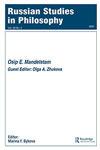人类宇宙论的要素
IF 0.1
4区 哲学
Q4 Arts and Humanities
引用次数: 0
摘要
在科学论文、神秘顿悟和与“宇宙主义”学派相关的散文小说之间,各种类型的混合作品已经被探索了50多年,其解释范围从(宗教)乌托邦到可持续发展理论。作者讨论了“宇宙主义”是否只属于“俄罗斯”的问题,将它的一般假设与过去十年的技术宇宙主义方法(包括那些涉及小说的方法,如尤金·塞克尔的方法,以及更哲学的方法,如许毓晖的方法)进行比较,并提出澄清宇宙主义者是如何从本质上看待世界结构的,以及他们是如何将其元素概念化的,而当代理论家对行星和宇宙视野的开放感兴趣。后者通常以核物理为导向,将“现实”分解为随机机构,这些随机机构的临时耦合是通过切割和组装过程形成的,可以从“宇宙主义”的角度重新表述,正如瓦莱里安·穆拉夫耶夫(Valerian Murav 'ev)和弗拉基米尔·沃尔纳德斯基(Vladimir Vernadsky)的作品中所收集的那样,借助扩展和成就的范畴。本文章由计算机程序翻译,如有差异,请以英文原文为准。
Elements of Anthropocosmism
ABSTRACT Various writings of mixed genres, drifting between scientific treatises, mystical epiphanies, and prose fiction related to the school of “cosmism,” have been explored for more than fifty years, and the interpretations range from (religious) utopia to theories of sustainable development. The author discusses the question of whether “cosmism” is exclusively “Russian,” compares its general postulates with the techno-Cosmist approaches of the last ten years (including those involving fiction, such as by Eugene Thacker, and the more philosophical approaches, like that applied by Yuk Hui), and proposes clarifying how the Cosmists literally viewed the structure of the world and how they conceptualized its elements as contrasted with the interest of contemporary theorists in openness to planetary and cosmic horizons. The latter, often oriented to nuclear physics and fragmenting “reality” into stochastic agencies whose temporary couplings are formed by cutting and assembling procedures, can be reformulated from the “cosmist” perspective as gleaned in this case from the works of Valerian Murav’ev and Vladimir Vernadsky, with the aid of the categories of expansion and accomplishment.
求助全文
通过发布文献求助,成功后即可免费获取论文全文。
去求助
来源期刊

RUSSIAN STUDIES IN PHILOSOPHY
PHILOSOPHY-
CiteScore
0.10
自引率
0.00%
发文量
14
期刊介绍:
Russian Studies in Philosophy publishes thematic issues featuring selected scholarly papers from conferences and joint research projects as well as from the leading Russian-language journals in philosophy. Thematic coverage ranges over significant theoretical topics as well as topics in the history of philosophy, both European and Russian, including issues focused on institutions, schools, and figures such as Bakhtin, Fedorov, Leontev, Losev, Rozanov, Solovev, and Zinovev.
 求助内容:
求助内容: 应助结果提醒方式:
应助结果提醒方式:


